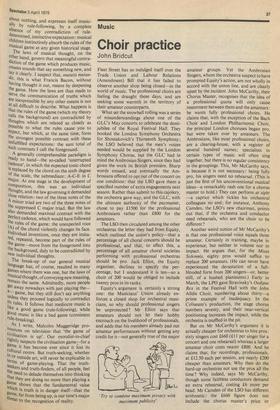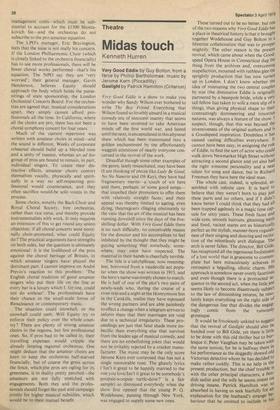Mu sic
Choir practice
John Bridcut
Fleet Street has so indulged itself over the Trade Union and Labour Relations (Amendment) Bill that it has failed to observe another shop being closed—in the world of music. The professional choirs are feeling the draught these days, and are seeking some warmth in the territory of their amateur counterparts.
What set the snowball rolling was a series of misunderstandings about one of the GLC's May concerts to celebrate the demi- jubilee of the Royal Festival Hall. They booked the London Symphony Orchestra for Shostakovich's Thirteenth Symphony; the LSO believed that the men's voices needed would be supplied by the London Symphony Chorus, but the GLC had in mind the Ambrosian Singers, since they had given the work its British premiere. Sharp words ensued, and eventually the Am- brosians offered to opt out of the concert on one condition: that the LSO gave them a specified number of extra engagements next season. Rather than submit to this cajolery, the orchestra gave way, and the GLC, with the ultimate authority of the paymaster, chose to pay £1500 for the professional Ambrosians rather than £800 for the amateurs.
The LSO then circulated among the other orchestras the letter they had from Equity, which outlined the union's policy—that a percentage of all choral concerts should be professional, and that, to effect this, a percentage of all amateur choral societies performing with professional orchestras should be pro. Jack Elliot, the Equity organiser, declines to specify the per- centage, but I understand it is ten—so a choir of 200 would be obliged to include twenty pros in its ranks.
Equity's argument is certainly a strong one: the Musicians' Union already en- forces a closed shop for orchestral musi- cians, so why should professional singers be unprotected ? Mr Elliot says that amateurs should not let their hobby encroach on the livelihood of professionals, and adds that his members already pad out amateur performances without getting any credit for it—not generally true of the major 'Try to combine maximum privacy with maximum publicity' amateur groups. Yet the Ambrosian Singers, whom the orchestra suspect to have prompted Equity's action, are not wholly in accord with the union line, and are clearly upset by the incident. John McCarthy, their Chorus Master, recognises that the idea of a professional quota will only cause ,resentment between them and the amateurs: he wants fully professional choirs. He claims that, with the exception of the Bach Choir and London Philharmonic Choir, the principal London choruses began pro, but were taken over by amateurs. The Ambrosians, like most professional choirs, are a clearing-house, with a register of several hundred names; specialists in certain types of music will often sing together, but there is no regular consistency in the groupings. This, Mr McCarthy says, is because it is not necessary: being fully pro, his singers need no rehearsal. (This is just the first of his unconventional musical ideas--a remarkably rash one for a chorus master to hold.) They can perform at sight —a caprice which tickles his orchestral colleagues no end; for instance, Anthony Camden, the LSO's new chairman, points out that, if the orchestra and conductor need rehearsals, who are the choir to be different ?
Another weird notion of Mr McCarthy's is that one professional voice equals three amateur. Certainly in training, maybe in experience, but neither in volume nor in impact. He argues that, for the Missa Solemnis, eighty pros would suffice to replace 200 amateurs. (He can never have experienced the devastation of a full- blooded forte from 200 singers—or, better still, of a hushed pianissimo.) Early in March, the LPO gave Stravinsky's Oedipus Rex in the Festival Hall with the John Alldis Choir, numbering about thirty—a prime example of inadequacy. In the Coliseum's production, the stage chorus numbers seventy, and their near-vertical positioning increases the impact, while the orchestra is muffled in the pit.
But on Mr McCarthy's argument it is actually cheaper for orchestras to hire pros: sixty singers cost £660 (£11 per singer for a concert and one rehearsal) whereas a larger amateur choir costs nearer £800. And he claims that, for recordings, professionals, at £12.50 each per session, are nearly £200 cheaper than amateurs. Why then do the hard-up orchestras not use the pros all the time? Why indeed, says Mr McCarthy, though some faithless conductors demand an extra rehearsal, costing £6 more per head. Mr Camden of the LSO has different arithmetic: the £660 figure does not include the chorus master's price or
management costs—which must be sub- stantial to account for the £1500 Shosta- kovich fee—and the orchestras do not subscribe to the pro/amateur equation.
The LPO's manager, Eric Bravington, feels that the issue is not really his concern. If the London Philharmonic Choir (which is closely linked to the orchestra financially) has to use more professionals, there will be fewer choral works performed—that's his equation. The NPO say they are 'very worried'; their general manager, Gavin Henderson, believes Equity should approach the body which holds the purse- strings of state sponsorship, the London Orchestral Concerts Board. For the orches- tras are agreed that, musical considerations apart, they simply cannot afford pro- fessionals all the time. In California, where all the choirs are pro, there has not been a choral symphony concert for four years.
Much of the current repertoire was written with amateur choirs in mind—and the sound is different. Weeks of corporate rehearsal should build up a blended tone and a unity of nuance, whereas an ad hoc group of pros are bound to remain, in part, individual singers. To create their dis- tinctive effects, amateur choirs contort themselves vocally, physically and spirit- ually in a way no self-respecting pro- fessional would countenance, and they often sacrifice would-be solo voices in the process.
Some choirs, notably the Bach Choir and Royal Choral Society, hire orchestras, rather than vice versa, and thereby provide instrumentalists with work. It only requires an extension of this to get round any union objection: if all choral concerts were nomi- nally choir-promoted, what could Equity do? The practical arguments have strengths on both sides, but the question is ultimately emotional : it is the livelihood of the pros against the choral heritage of Britain, in which amateur singers have played the dominant part. I cannot improve on Andre Previn's reaction to this problem: 'The English choral tradition of good amateur singers who put their life on the line at every bar is a luxury which I, for one, could not do without'. The professionals have their chance in the small-scale forms of Renaissance or contemporary music.
The situation could snowball, or the snowball could melt. Will Equity try to enforce their policy over the whole coun- try? There are plenty of strong amateur choirs in the regions, but few professional ones. So, if pros had to be called in, their travelling expenses would cripple the already limping regional orchestras. One might deduce that the amateur choirs are keen to keep the orchestras half-starved financially, but of course the grass across the fence, which the pros are ogling for its greenness, is in reality pretty parched—the amateurs are not fully stretched with engagements. Both they and the profes- sionals should forget the past and campaign jointly for higher musical subsidies, which would be to their mutual benefit.



































 Previous page
Previous page